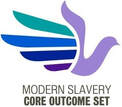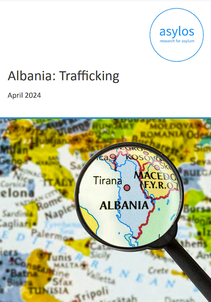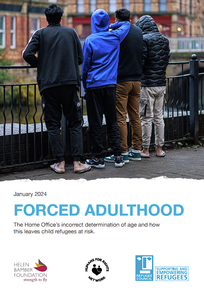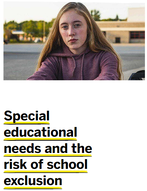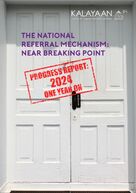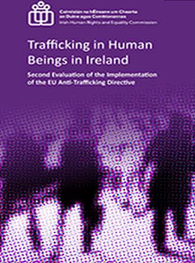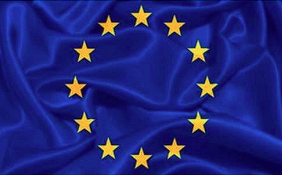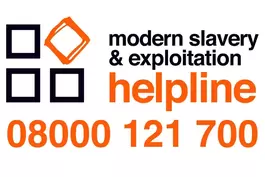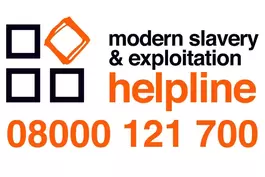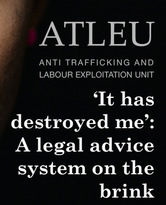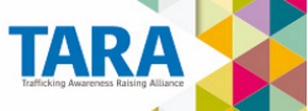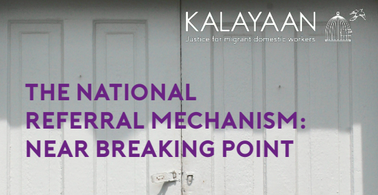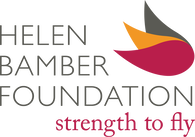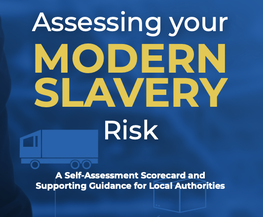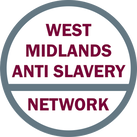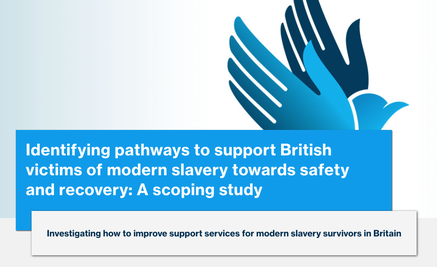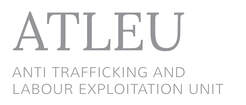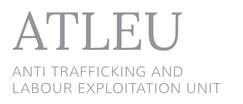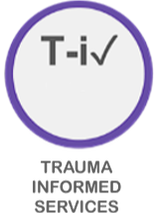"Safety from any trafficker or other abuser is important becasue after trafficking you are vulnerable and can face danger from other traffickers and abusers as well as those who trafficked you before. You have to feel able to trust in the police and the legal system for protection, and confident to report crimes without fear."
"Safety from any trafficker or other abuser is important becasue after trafficking you are vulnerable and can face danger from other traffickers and abusers as well as those who trafficked you before. You have to feel able to trust in the police and the legal system for protection, and confident to report crimes without fear."
|
|
x
We are on a clock and all the time we have fear, tick tock tick tock: In the year 2012, the UK Government removed the rights attached to the UK Domestic Worker visa. Before 2012, domestic workers had the right to renew their visa, the right to eventual settlement and British citizenship. Since the change, domestic workers have only six months to stay in the UK. In 2015 they obtained the right to change their employer which is vital to ensure they are not in the power of one employer who could exploit them. However, they would have to try to change employer very quickly, and after only six months they will become undocumented in the UK and therefore lose their right to work. What we explain all the time in our campaign is that no decent employer is going to hire a domestic worker within this short term period, unless they are an abusive employer who will take advantage of the workers' vulnerability. This happens a lot and workers are hidden in abusive, private households. If we are referred to the NRM after the six months, we lose our right to work. So many domestic workers are trapped in exploitation in the UK because they must send needed money back to their families. |
x
It is important to have survivor leaders professionally employed in criminal justice systems as independent expert consultants, victim support advocates and victim navigators. I work as an expert consultant on organized crime and illicit ‘massage parlors’ for Attorney General hearings in the USA, and I also work ‘on the ground’ with police and prosecutors. In the course of my work I have helped to close down many brothels in the USA in collaboration with police, and I have also undertaken vital outreach work to help women who are, or have been, trapped in situations of sexual exploitation. This includes providing individual support throughout criminal investigation, prosecution, and vital follow up after a case has concluded. Survivor Leaders can understand the specific needs of victims: we are trusted by survivors, so we can provide support, guidance, mentorship and empowerment. We can help survivors to pursue justice against their traffickers, and by securing convictions, we prevent other adults and children being victimized. When survivor leaders act as consultant experts, it supports survivors to feel more confident about providing their own witness testimony. Survivors know better than anyone the abuse and violence that traffickers inflict on their victims and their information can help Judges and courts to understand operations, trends and patterns of human trafficking. It also lessens the need for excessive questioning of victims. The ISTAC Code of Practice is clear on the need for appropriate renumeration and professionalization of survivor leadership: our narrative must not merely be inspiring, but the lessons that lie within must be turned into solutions.” In 2011 Shandra co-founded a survivor leadership program called “Voices of Hope” in New York. F.2013-2017, she was the State of New Jersey Commissioner on Human Trafficking. In 2014, Shandra participated in the first Federal Survivor Forum Listening Session at the United States White House and she was appointed by former President Barack Obama to be a member of the first United States Advisory Council on Human Trafficking. Since 2017, Shandra has been a survivor advisor, consultant and trainer for ODHIR-OSCE and is a consultant expert for the 2nd Edition NRM Handbook.* Shandra has been honored by multiple government and non-government organizations and has been a motivational and inspirational speaker at events for institutions around the world. She was a 2017 L’Oréal Paris Women of Worth National Honoree and she was one of the year of 2020, and 2021 Top 100 Most Influential Asian Americans in New York politics and policy. In 2022 Shandra received recognition as one of The 2022 Power of Diversity: Asian 100 New York’s Asian American trailblazers. Shandra is a human trafficking expert witness, specifically on Illicit Massage Parlors and organized crime. Shandra has also authored Taste of Freedom, recipes for resilience to benefit survivors of trafficking. |
The MSCOS Research Advisory Board make recommendations for criminal justice systems
x
- Expansion of the Victim Navigators pilot to apply to all police forces.
- Employment of Survivor Leaders: the Research Advisory Board agree that the professional employment of Survivor Leaders is key, both to the training of the police at all levels, and to working with Helplines and Victim Navigator Teams. In the view of the RAB, and other survivors involved in the MSCOS project, professional Survivor Leaders who are appropriately accredited and employed could offer a vital welcome into situations of safety after trafficking and reporting of crime for the many survivors who feel far too afraid to come forward.
- Ongoing training for police at all levels from recruitment upwards, with specific modules on trauma-informed methods of working with survivors; identification of victims of trafficking and also the wide range of traffickers and their associates (including private lawyers sent to represent victims).
- Training on and incorporation of the SIPPS across the criminal justice system
- Long-term, consistent support throughout criminal justice procedures for vulnerable victims and dependents. This should be connected to the individual support provided via the NRM and not restricted solely to Victim Navigators and police.
- Accountability of police forces for full follow up and provision of advice and support for victims whenever cases are closed or at regular intervals while cases remain open.
“Safety from any trafficker or other abuser requires access to legal aid: legal advice and representation is critical to securing identification and support under the National Referral Mechanism, asylum and other forms of protection. It is also vital to securing access to appropriate housing and support and compensation. Access to compensation plays an important role in assisting survivors to remain safe from their traffickers, recover from their experience and move forward in their lives.”
Victoria Marks, Director and Solicitor, Anti Trafficking and Labour Exploitation Unit
MSCOS study descriptor: This outcome includes a safe rescue process as well as sustained safety from all traffickers and abusers. It is critical that survivors live free from fear that perpetrators will recapture them, find out where they live, or threaten them in some way. Safety from new perpetrators who can target victims for re-trafficking or harm them in other ways is also vital. Ongoing safety can involve multiple aspects such as: having a landline to call emergency services in a safe house; living far from traffickers and their associates; and the police being careful in the way they handle cases. This outcome includes psychological safety from traffickers.
Relevant Practice Models and Frameworks
for safety from any trafficker or other abuser
for safety from any trafficker or other abuser
Legal Support
|
The following report, Albania: Trafficking, presents country of origin information (COI) on trafficked Albanian men, women and children. This research was initiated in response to a need identified by legal representatives and practitioners in the field of asylum for information on the conditions experienced by trafficked men, women and children in Albania. Research terms of reference were developed in consultation with legal representatives to shed light on under-researched issues.
|
Hundreds of children seeking asylum in the UK are being incorrectly assessed by the Home Office using a short visual assessment shortly after their arrival. This flawed decision-making process results in children being placed in unsupervised adult accommodation and immigration detention, exposing them to significant risks and potential harm. This joint report by the Helen Bamber Foundation, Humans for Rights Network and the Refugee Council provides updated evidence of the Home Office improperly treating large numbers of children seeking asylum as adults upon arrival in the UK.
x
THE HOME OFFICE SHOULD:
|
Child Criminal Exploitation
|
The Home Office have released a research and analysis report on devloved decision-making for child victims of mdoern slavery. This pilot policy has been shown to be successful, and provides an improved and streamlined process for conclusive grounds decisions, as well as providing the opportunity for multi-agency collaboration on decision making. It also raised the awareness and understanding of the NRM.
x
Report recommendations: 1. Any future monitoring should evidence how children’s views are presented to, and taken into consideration by, the panel.
6. Differences in legislation and governance need to be taken into consideration when rolling out to devolved nations, in particular how NRM decision-making connects into the safeguarding processes. |
Exploitation and County Lines Specialist Sabrina Hewitt shares her lived experience and expertise on childhood exploitation, need for early intervention and trauma-informed care. This podcast episode hosted by Able Training Support provides a profound look into the experience of childhood trauma and the journey from a survivor to survivor leader. Sabrina Hewitt advocates for youth justice in her work as a trainer for numerous organisations.
|
|
Action for Children released a report on criminal exploitation across the UK. The review collected evidence from over 70 organisations, and individuals with lived experience of exploitation. The collated results were analysed to outline risk factors for exploitation, and set out recommendations for the UK government, judicial system, and organisations working with survivors of criminal exploitation.
|
In their blog on Special Educational Needs (SEN), The Children's Society details the exclusion of children with SEN from school. The blog details main risks and issues of school explusion. These were identified by working with children with SEN.
|
"The criminal exploitation of children is a complex type of child abuse where a young
|
"Isolation and exclusion do more harm than good – damaging a child's learning and having negative impact on their mental health." |
|
x
Report recommendations: 1. A single, cohesive legal code designed to tackle the criminal exploitation of children.
|
x
Report recommendations: 1. Race & Ethnicity
|
National Referral Mechanism Progress Report
The National Referral Mechanism: Near Breaking Point
In this report Kalayaan details the pressing need to train and recruit First Responder Organisations to meet the needs of and support survivors of modern slavery.
"The capacity of the current number of non-statutory First Responder Organisations remains a pressing issue that needs to be urgently addressed by the Government"
x
Report recommendations:
- Consider and decide on existing applications from specialist front line organisations to become a First Responder Organisation
- Establish a recruitment process without further delay for prospective organisations to apply
- Develop and maintain a nationwide training programme for both statutory and non-statutory First Responder Organisations
- Provide funding for First Responder Organisations to carry out their roles
Tackling Criminal Exploitation
|
Centre for Social Justice and Justice and Care have released joint renewed vision for the fight against modern slavery in the UK that sets out six priority recommendations for how the next government can take seriously the challenge of modern slavery in the first year after the election.
|
In this report Centre for Social Justice and Justice and Care outline how criminal exploitation takes advantage of young people and vulnerable adults, and sets out recommendations on how to tackle criminal exploitation.
|
"The next government has a unique opportunity and a duty to put things right by reinvigorating the UK’s response to modern slavery, where political leadership has waned." |
"Young people become ostracised by adults in their community, who see only the crimes being committed and not the chain of exploitation." |
|
x
Top six recommendations for action in the first year of the new government’s term: 1. Re-assign ministerial responsibilities to reflect the true nature of modern slavery crime. 2. Review and address the impact of the recently introduced policy and legislation, particularly the Nationality and Borders Act 2022 and the Illegal Migration Act 2023. 3. Develop a new cross-departmental strategy to reinvigorate the response to modern slavery. 4. Ensure needs-based support is available to all victims of modern slavery by reviewing the National Referral Mechanism and rolling out the Victim Navigator programme. 5. Close legal gaps by introducing a new Modern Slavery Bill that would strengthen our response to criminal exploitation: 1) amend the Modern Slavery Act to include the definition of criminal exploitation and 2) introduce a new criminal offence of cuckooing. 6. Strengthen UK Government policy and legislation to prevent modern slavery in business and public sector supply chains. |
x
Criminal exploitation: Modern slavery by another name Report recommendations 1. The Government should amend the Modern Slavery Act 2015 to make it work better for criminal exploitation, amending the Act as follows:
3. The Government should create a specific offence to criminalise the act of cuckooing as a form of modern slavery (see our previous reports 'Cuckooing 2021', and 'Slavery at Home' 2023). 4. Every opportunity must be taken to safeguard potential victims of criminal exploitation identified in the criminal justice system. The Home Office should update the guidance ‘Criminal exploitation of children and vulnerable adults: county lines’ and the Modern Slavery: statutory guidance for England and Wales (under s49 of the Modern Slavery Act 2015) to set out a clear referral pathway to local charitable diversion programmes for young people exiting youth justice services because a prosecution has been dropped due to the young person being a victim of criminal exploitation. 5. To identify challenges and ensure good practice in the response to victims of criminal exploitation in the criminal justice system:
7. The Home Office and the Ministry of Justice should smooth the pathway for victims into the NRM and MSVCC support from prison by:
9. The Home Office should make the ICTG service a comprehensive national service 10. Local authorities should provide holistic support for adults who are at risk of or have become victims of criminal exploitation:
12. All victims of modern slavery who are eligible for social housing should be exempt from local connection conditions and have priority access to social housing. This should include victims of criminal exploitation and cuckooing and should not necessarily depend on them consenting to a referral to the NRM 13. Funders of community groups and charities should prioritise sustained funding for providing youth work, activities and support to young people and vulnerable adults at risk of or who have experienced criminal exploitation. 14. DLUHC should work with the Regulator of Social Housing and the new Ombudsman for the private rental sector (resulting from the Renters (Reform) Bill) to issue guidance for all landlords (social and private) and housing associations on the risk factors, indicators and best policy and practice for responding to cuckooing 15. Every local authority should establish multi-agency case conference processes (like MARAC, or MASH) to respond to every potential victim of criminal exploitation (and all other forms of modern slavery) at identification and to monitor and ensure support for victims’ care needs before and during the NRM if they are referred and outside the NRM if not. 16. The Home Office and Chief Constables should prioritise and resource increased neighbourhood policing. Including:
18. The Department for Education should update the statutory guidance ‘The Children Act 1989 guidance and regulations Volume 3: planning transition to adulthood for care leavers’ to include a specific section on considering the risks of exploitation for care leavers and requiring consideration of the type of accommodation, location of that accommodation and the need to enable continuation of protective factors in a young person’s life such as proximity to new and existing services and support networks. 19. The Department for Education should bring forward regulations under section 35 of the Children and Social Work Act 2017 to require that criminal exploitation is included in personal social, health and economic education. Guidance should also outline the benefit of commissioning specialist independent charities to provide that education and note the additional benefits of involving staff with relevant personal experience in delivering such sessions. 20. Schools and the Department for Education should take steps to develop and strengthen the approach to inclusion by adding inclusion as a fifth key judgement in Ofsted inspections; introducing a national inclusion framework for schools and academy trusts. 21.The Government should take steps to address root causes of vulnerability by:
|
Licensing Frameworks and Teams
|
Keith Lewis MSCOS Research Advisory Board |
|
Shiva Foundation’s latest report 'Understanding the Potential of Licensing Frameworks and Teams to Tackle Modern Slavery in the UK’ identifies key principles for leveraging existing frameworks which are already used by licensing and enforcement teams to embed anti-modern slavery responses and provide practical solutions for enhancing anti-modern slavery provisions across licensed sectors.
|
At the recent Cyprus Forum speaking a on a panel focused on business and human rights, Keith Lewis described being ‘trafficked ‘in plain sight’ and explained how he connects this experience to his proposal for the strengthening of existing health and safety licensing.
|
"The untapped potential of licensing provides a promising pathway for modern slavery prevention. With collaborative efforts from national and local authorities, we can transform routine procedures into powerful tools." |
"My trafficking for forced labour was ‘in plain sight’ of hundreds of people in the UK. It made me realise that health and safety licensing should be strengthened to include us"
|
|
x
“Modern slavery can be identified across a number of council areas including, licensing, environmental health and trading standards, housing, procurement, community safety and social services. There are 333 local authorities in England and approximately 1.4 million private sector businesses (Federation of Small Business) which support the efforts of licensing frameworks.
Shiva Foundation’s latest report 'Understanding the Potential of Licensing Frameworks and Teams to Tackle Modern Slavery in the UK’ identifies key principles for leveraging existing frameworks which are already used by licensing and enforcement teams to embed anti-modern slavery responses and provide practical solutions for enhancing anti-modern slavery provisions across licensed sectors. We believe that this approach could be applied to existing licensing frameworks on a far wider scale internationally. Licensing teams visit towns and cities and rural/remote/agricultural areas throughout the year: To combat modern slavery they need:
We recommend:
Key to this approach is partnership working between licensing teams and law enforcement: Cross-agency collaboration and intelligence-sharing should be systematized and strengthened to swiftly disrupt and dismantle modern slavery operations. By undertaking joint operations, the relevant law enforcement organisations and partners can be present together to discuss areas or premises of concern. They can work more quickly to deal with the crimes and is an effective way to pool capacity and resources to ensure an efficient response.” "Implementing these measures, can raise awareness and establish clear fostering a vigilant and informed society."
The Shiva report will be presented at the Institute of Licensing National Training Conference on 15th November.
Shiva Foundation has 3 webinars you can watch on YouTube: Empowering licensing teams; How to raise awareness amongst license holders and Partnership working with law enforcement. |
x
© Keith Lewis at [email protected]
As a person entrapped in modern slavery for 8 years in the UK, I laboured in landscaping private properties, building conservatories and patios, making driveways, pathways, walls, or doing any cleaning or other work the trafficker could profit from, I qualified as a chef at college, it was a vocation I loved. However, immediately after leaving college, I became homeless. I was sleeping rough in the streets, unable to claim benefits or to get a job because I didn’t have a fixed address. By the time I was offered a rough place to stay by the traffickers and work as a builder, I was desperate for help. Gradually the control and the working hours ramped up – they don’t show you this side for a while. Soon the traffickers were controlling me in forced labour 10-12 hours a day, 7 days a week. Then the violence began after about 6 months, when I thought I was having my first day off. The main trafficker called me out of the shed I lived in with other men and asked me what I had been doing. He then punched me in the face and landed other blows, beating me. From that point the violence and control stepped up. After the first violent incident, my working hours were stepped up to a point where we were labouring between 12-16 hours a day, because the trafficker told us not to come back unless the work was finished. There was always fear in us about what would happen to us if we returned ‘too soon’. Over the course of 8 years, I tried to escape 3 times, and each time I was kidnapped by men, thrown in a lorry, beaten up and brought back.
It is not only about doing a normal job without being paid, which is a terrible thing. It is also arduous work, using dangerous tools and labouring over long periods of time in which you feel exhausted. The potential for injury is high. We were given hazardous work tools and conditions with no health and safety regulations, and we were not given protective clothing or equipment of any kind. From day to day, I couldn’t wash myself on the site where I lived; I had no access to a toilet and no running water. We had to use public rest rooms or toilets. Washing on the site meant being able to get water and boil a kettle. I slept in small caravans or sheds which I was forced to share with strangers, sometimes I had to share a bed with a stranger as well: we had to lie top to tail. "To me, licensing for health and safety, says it all – on any site or in any venue if you are not healthy and you are not safe because you are in modern slavery, it should apply to you"
I met thousands of ordinary people while this was happening to me: customers for these building services, their family members multiple people in the local communities, and members of the public, wherever we went. When I say ‘trafficked in plain sight, we were in people’ s own private houses, and we were making driveways, patios, walls, conservatories, being seen by others outside. We were dressed in filthy clothing, which was completely inadequate for the work we were doing, and our skin was dirty from one day to the next. Our shoes were falling off our feet. The traffickers would turn up in a really smart suit and nice car – but the customers did not see this difference – all they would see was the cheap job they were getting.
We had encounters with the police during this time. Sometimes the jobs would get ‘boosted’ by the traffickers, meaning that they would fraudulently put the price up in the course of the job and make us try to extort the customer. The people in the house would sometimes call the police and the police would arrest us and take us to the police station. There would always be a lawyer waiting there for us, who was paid on retainer and sent by the trafficker to ‘represent’ us, or in other words, to keep us silent. We never got the chance to speak to the police, and despite our vulnerability and shabby appearance, they did not ask us any questions about our circumstances. We were instructed by the lawyer what to say and what not to say. I remember the lawyer and the traffickers laughing about this afterwards; they had got away with it. We went into a lot of rest rooms, public toilets, restaurants and take-aways, garages and many other venues, to use toilets and bathrooms (although they would often refuse to let us in, due to our shabby appearance). I saw lots of signs saying ‘Health and Safety’ in these places. If you are being held in modern slavery against your will or working long hours for little or no pay , it is a health and safety risk. I think there is a nervous approach globally to anti-trafficking responses, and a resistance to starting up new licensing systems or going to expense. "I feel sure that if modern slavery licensing and inspections were directly attached to existing health and safety licensing, it would be a lot easier to move forward and to get a greater understanding of a true definition of what health and safety standards must be in every workplace" |
Anti-Trafficking Directives
|
Trafficking in Human Beings in Ireland: The second
Evaluation Report on the progress made and actions undertaken by the State to address and combat human trafficking, in all its forms is a resource for national policy makers, practitioners, researchers, and the general public. The report’s approach is centred in distinct procedures for adults and children, with reference to the international OSCE/ODIHR NRM Handbook and stating that: |
Directive 2011/36/EU (‘the EU Anti-Trafficking Directive’) provides a comprehensive legal framework for EU Member States. covering criminalisation of the offences, prevention, as well as protection in the criminal justice process, assistance and support. Article 19 obliges EU Member States to establish national rapporteurs (or equivalent mechanisms) to assess trends, measures results of anti-trafficking actions, gather statistics and report.
|
"Ireland’s new NRM is an essential part of the anti-trafficking framework. Providing for a victim-centred identification pathway with clear assistance and support to victims in statute is significant. " |
x
Proposed amendments to Anti-Trafficking Directive include: ▪ Adding forced marriage and illegal adoption among the forms of exploitation explicitly covered in the Directive; ▪ Explicitly referring to the misuse of the internet, social media, to commit trafficking offences; strengthening the sanctions for companies (Elegal persons) held accountable for trafficking offences introducing a mandatory sanctions regimes; ▪ Formalising the National Referral Mechanisms, which deal with identification of victims and their referral to protection, assistance and support services; ▪ Requiring Member States to criminalise the knowing use services exacted from victims of trafficking in human beings; • Formalising an annual data collection on trafficking indicators. |
Safety in Reporting to Police
|
Justice and Care Victim Navigators are embedded within several police forces and regions in England, Police Scotland and in Romania. The navigator role is to act as a bridge between recovered victims of trafficking/modern slavery and law enforcement. To read more about Justice and Care Victim Navigators, click below.
|
UK Modern Slavery & Exploitation Helpline by Unseen UK is a free and confidential helpline, open 24 hours and available in 200 language. It provides information, advice and guidance about any modern slavery issue to potential victims and survivors, the public, statutory agencies such as the NHS and police, and businesses.
|
|
x
Justice and Care Victim Navigators are embedded within several police forces and regions in England, Police Scotland and in Romania. The navigator role is to act as a bridge between recovered victims of trafficking/modern slavery and law enforcement. The Navigator programme began in Surrey and Kent after successful work in India and Bangladesh. The programme has been independently evaluated showing that victims supported by a navigator engaged and remain engaged with Police and the judicial process in 92% of cases compared to the National figure of just 44%. Victim Navigators should be available to engage with victims from the moment of identification by police, or at any time when other victims may wish to approach the police to provide information or report a crime. They can provide trauma-informed and specialist support immediately, and seamless ongoing coordination between the victim and the officers who may interview them and investigate their case. They help victims to understand their rights and entitlements and work with them to create an individualised support plan, in accordance with their needs, priorities and aspirations. They can act as an advocate and where necessary chaperone, helping victims to ‘navigate’ the complex landscape of services and entitlements and their journey through the criminal justice process. "Our hope is that through our advocacy work, victims will feel better supported and therefore be better able to support police with bringing their perpetrators to justice. As such, the role also involves supporting police and local stakeholders with training to help increase their confidence as they manage complex cases and act as first responders to potential victims. We collaborate closely with trusted partners in source countries to ensure end to end support, as well as to identify and share best practices for systemic change." |
x
When calling the helpline, you can: 1. Speak to a trained adviser who can help you with a range of options, including:
3. Have an initial safety check with an adviser 4. Explain what you need 5. Talk through potential options and next steps, including:
You can also report online via the online form. |
|
Safety in the Criminal Justice System
Systemic Investigation, Protection and Protection Strategy (SIPPS) by Dr Craig Barlow provides practitioners and investigators with a systemic approach to investigation, assessment and intervention for cases of modern slavery/human trafficking and other forms of general violence, harassment and intimidation.
x
Systemic Investigation, Protection and Protection Strategy (SIPPS) by Dr Craig Barlow provides practitioners and investigators with a systemic approach to investigation, assessment and intervention for cases of modern slavery/human trafficking and other forms of general violence, harassment and intimidation. It provides a pathway intended principally for use in the assessment of risk and can be used to contribute to safety and rehabilitation planning, Achieving Best Evidence (ABE) and Suspect Interview Strategies, and disruption and prosecution strategies in cases of actual or suspected Trafficking, Slavery, Servitude and Sexual Exploitation. It works especially well in the context of multi-disciplinary or team settings and is well suited to joint-agency strategic planning and tactical decision making in safeguarding investigations and investigations of modern slavery/human trafficking offences. It can be used as an initial assessment tool, or as a method of monitoring and measuring progress by applying and coding the items periodically during the implementation of safety plans and direct working with victims and perpetrators. The model emphasises that abuse and exploitation can be placed upon both a temporal and developmental continuum. It is crucial to make sense of the context from which the victim and abuser have come.
“I am delighted to endorse Craig and the SIPPS Model, I have given lectures with him to a variety of academics, practitioners and investigators at all levels. His contribution to my specialist field of work has transformed my practice. His ability to absorb the nuances of a criminal case, apply known theory and support it with the material provided, organize this within the SIPPS Model and then give me a path through which to prosecute the case is priceless.” Caroline Haughey KC, OBE “The SIPPS has been invaluable in the complex area of Child Sexual Exploitation. The SIPPs links with the FRaSA in the methodology of organising information to identify gaps and meaning, however the SIPPS has the multi-faceted dimension of drawing the practitioners attention to issues of trafficking, exploitation, modern slavery in addition to risk of, or actual sexual exploitation. The SIPPS enables the objective analysis of behaviour and information to create multiple hypotheses for a young person. The SIPPS training provides an advanced level of knowledge regarding the legal options that the Police might use to disrupt the behaviour, and encourages Social Work staff to make suggestions using this knowledge to their Police colleagues.” Head of Child Safeguarding, London "I was the senior investigating officer in the UK’s first successful prosecution of Domestic Servitude within a marriage. The SIPPS Model was crucial in a case plagued with complexities of Honour Based Violence, Human Trafficking, Modern Slavery, and control and coercion. The SIPPS assessed vulnerability and risk to the victim and other witnesses, proving useful not just to the investigation but the Prosecuting Counsel also. Outside of the trial process, Craig Barlow expertly assisted police in achieving a multi-agency safeguarding plan. The successful prosecution was hailed as groundbreaking and Craig should be credited for his input into this high-profile and complex case." Detective Sergeant, London Metropolitan Police “The CSE risk assessment tool helped me to organise the information that I already had about the case and highlighted areas that I did not have any/enough information about and needed to explore further. Exploring the different possible risk factors for CSE enabled me to identify which areas of my intervention with the young person should be prioritised. The tool also helped in working with other professionals on the case, I used the tool to structure a strategy meeting and I think that this eased the anxiety of some of the other professionals.” Social Worker, London |
Access to legal aid for advice and representation In their report, ‘It has destroyed me’: A legal advice system on the brink, ATLEU are calling on the government to urgently reform the legal aid system for survivors.
x
"I have seen first hand throughout my work, the transformational role that quality and timely legal advice and representation can have for survivors. I have also seen the devastating consequences when survivors are not able to access this: destitution, homelessness, detention, criminalisation, removal and further exploitation."
Urmila Bhoola (former UN Special Rapporteur on Contemporary Forms of Slavery) in the foreword of the ATLEU report, "It has destroyed me’: A legal advice system on the brink". In their report, ‘It has destroyed me’: A legal advice system on the brink, ATLEU are calling on the government to urgently reform the legal aid system for survivors. Survivors of trafficking and modern slavery should be able to access free, specialist, quality legal advice and representation when they need it, without delay. In its current form the legal aid system prevents this. The following urgent changes to the legal aid system are required.
The legal aid system should be effective and efficient, founded on evidence based policy, with fair and equitable payment so that it is sustainable for providers and guarantees survivors of trafficking and modern slavery access to justice now and in the future.
It is in the public interest that the legal aid system support survivors to hold the perpetrators of trafficking and modern slavery to account. The barriers to accessing legal advice which prevent survivors from bringing trafficking and modern slavery compensation claims should be removed.
|
Organisations with long term safety focus
|
TARA (Trafficking Awareness Raising Alliance) was established in 2004 to provide support to women who may be trafficked and exploited, as now defined in the Human Trafficking and Exploitation Act (Scot) 2015.We are funded by the Scottish Government to support women, aged 18 years and over, who have been trafficked for the purposes of commercial sexual exploitation.
To find out more, please see below including how to keep safe online. x
We work with women to provide trauma informed, practical, and emotional support to recover from their experiences. Our service, which includes a 24/7 crisis response, is available to women recovered from across Scotland. We can provide interpreters and translation services as needed.
If you have been trafficked, abused, or someone is watching or monitoring your activity, they might find out you are looking for help. Stay safe online! If you are concerned about your safety, please follow the steps below so that no one will know you have visited this webpage. Browse the Internet safely and delete your browser history When you browse the internet, your browser automatically saves pages and graphics (called cache). One way you can protect yourself is to clear your history or empty your cache file in your browser's settings. How to do that depends on which browser you are using. See below for instructions. If you are unsure what browser you are using, click here to find out.
Mobile Phone Turn off all your geo-location services. Sync or back up your phone and do a factory reset. Reinstall your data and apps but be careful not to reinstall any 'find your phone' apps or any apps that you don't recognise. Also make sure you change your password on your mobile phone account and secret pin. |
The Voice of Domestic Workers is an education and support group calling for justice and rights for Britain's sixteen thousand migrant domestic workers. We provide support for domestic workers who exit from abusive employers. Our work seeks to end discrimination and protect migrant domestic workers living in the UK by providing or assisting in the provision of education, training, healthcare and legal advice. We provide educational and community activities for domestic workers - including English language lessons, drama and art classes, and employment advice.
x
We wish to raise awareness of our campaign to improve the living and working conditions of migrant domestic workers in the UK and to increase respect for the work that we do. As well as speaking out for our rights we also solve each other’s practical problems. We find each other emergency accommodation and pool our resources to provide food and clothing. Together we search for ways to overcome our isolation and vulnerability and demand respect as workers, as contributors to the British economy and society, and as human beings. |
|
The National Referral Mechanism: Near Breaking Point
This briefing is a rapid response to the pressing need to review the numbers of, and available resources to, designated First Responder Organisations in the UK. It comes after Kalayaan issued an urgent Public Announcement with our concerns on 30 January 2023. x
In this report, Kalayaan makes the following urgent recommendations:
|
Helen Bamber Foundation (HBF): Counter Trafficking Programme is a specialist programme which is designed for the long term support of adult survivors who have been trafficked for all forms of exploitation. The programme operates within HBF's Model of Integrated Care. Survivors are provided with assessment, contact, accompanying and safeguarding support in accordance with need, as well as documentation in the form of letters and witness statements for lawyers' submission to courts and decision makers. x
"At the core of the Helen Bamber Foundation’s long-term Counter-Trafficking Programme is the principle of ensuring that our clients – adults who have suffered all forms of human trafficking - remain safe from any traffickers or abusers. We achieve this by building trusting relationships and proactively working with survivors to continuously identify, understand and monitor their specific risks and fears. In this way, we can more easily detect and address any concerning change of circumstances with the survivor in a trauma-informed way. It is important to note that the likelihood and severity of a client’s risk is rarely static; a person’s situation can rapidly change, requiring a trusting, long-term professional relationship with survivors to recognise the nuances of their presentation during each interaction. Practically, one of the goals of our programme is to create a safe & collaborative ‘circle’ of professionals around each of our clients. This enables each person to feel empowered and supported in whichever way is most suitable for them. As part of this, our team regularly supports survivors to overcome the difficult step of engaging with the police and/or victim navigators." Dragana Wright, HBF Counter-Trafficking Programme Manager |
Assessing Modern Slavery risk in local authorities
|
Shiva Foundation's Self-Assessment Scorecard allows local authorities to easily assess their modern slavery risk across a number of key thematic areas and provide advice on how they can improve. An accompanying guide has also been created, providing tiered signposting to further resources, templates and frameworks allowing users to embed best practice across their work.
|
x
This scorecard allows local authorities to easily assess their modern slavery risk across a number of key thematic areas and provide advice on how they can improve. An accompanying guide has also been created, providing tiered signposting to further resources, templates and frameworks allowing users to embed best practice across their work.
This resource has been created in collaboration by Shiva Foundation, STOP THE TRAFFIK and the Mekong Club, with funding from the Home Office. The project was created in light of the Government’s ambitious package of measures to strengthen the Modern Slavery Act’s transparency legislation including, amongst other things, extending the reporting requirement to public bodies with a budget of £36 million or more.
This resource has been created in collaboration by Shiva Foundation, STOP THE TRAFFIK and the Mekong Club, with funding from the Home Office. The project was created in light of the Government’s ambitious package of measures to strengthen the Modern Slavery Act’s transparency legislation including, amongst other things, extending the reporting requirement to public bodies with a budget of £36 million or more.
Hubs and networks
|
Just Right Scotland's Scottish Anti-Trafficking & Exploitation Centre is the only specialist legal project in Scotland that provides direct legal advice and representation to child and adult survivors of trafficking and exploitation in Scotland regardless of nationality, gender, type of exploitation and geographical location.
x
Just Right Scotland's Scottish Anti-Trafficking & Exploitation Centre is the only specialist legal project in Scotland that provides direct legal advice and representation to child and adult survivors of trafficking and exploitation in Scotland regardless of nationality, gender, type of exploitation and geographical location. They also serve as a hub for legal outreach, policy, training and research in the area of human trafficking and exploitation. They use their team’s expertise to contribute to the fight against trafficking and exploitation at both the national and international level. Their model of legal advice provision has been classed as a model of best practice by the Organisation for Security and Co-operation in Europe (OSCE). “Access to advice and information about rights and entitlements at every stage of the survivor journey, along with a trauma informed human rights approach to legal representation is essential for survivors to be able to navigate complex legal processes they find themselves subjected to.” Anushya Kulupana, Senior Associate Just Right Scotland |
x
The West Midlands Anti-Slavery Network unites and enables partner organisations to work in collaboration to end modern slavery, human trafficking and exploitation.
We do this by identifying gaps, influencing change and facilitating solutions in order to protect and advocate for the vulnerable in society. Our Vision To be recognised worldwide as leaders in multi-agency partnership working to eradicate modern slavery, whilst ensuring the victims are at the centre of every aspect of our work. Our Objectives
|
Helpful Resources
Identifying pathways to support British victims of modern slavery towards safety and recovery
Since 2013, the number of British nationals referred into the National Referral Mechanism (NRM) as potential victims of modern slavery has increased year on year, rising from 90 in 2013 to 3,952 in 2021. These figures include potential adult and child victims, referred for labour, criminal and sexual exploitation as well as domestic servitude. The largest proportion of these referrals in 2021 was for criminal exploitation involving children, representing 55% of all referrals of British nationals. Recent studies have begun to uncover the experiences of British nationals who are exploited in modern slavery, including findings that British survivors are failed by the current support system (see Centre for Social Justice and Justice and Care report).
Through analysis of data collected via surveys, interviews with survivors, support practitioners and criminal justice professionals, and a review of case law and legislation, this scoping study investigated the pathways to support for British nationals who are potential victims of modern slavery.
You can read the full report here.
Since 2013, the number of British nationals referred into the National Referral Mechanism (NRM) as potential victims of modern slavery has increased year on year, rising from 90 in 2013 to 3,952 in 2021. These figures include potential adult and child victims, referred for labour, criminal and sexual exploitation as well as domestic servitude. The largest proportion of these referrals in 2021 was for criminal exploitation involving children, representing 55% of all referrals of British nationals. Recent studies have begun to uncover the experiences of British nationals who are exploited in modern slavery, including findings that British survivors are failed by the current support system (see Centre for Social Justice and Justice and Care report).
Through analysis of data collected via surveys, interviews with survivors, support practitioners and criminal justice professionals, and a review of case law and legislation, this scoping study investigated the pathways to support for British nationals who are potential victims of modern slavery.
You can read the full report here.
x
Project aims are:
The project also made the following recommendations:
Theme 1: Missed opportunities to identify and protect vulnerable British nationals, before and during exploitation, especially common for those exploited in criminal activities.
Theme 2: British national survivors of modern slavery often have complex vulnerabilities and needs. Support needs127 to be provided to build resilience and prevent re-exploitation.
Theme 3: Barriers to survivors accessing specialist support through the NRM due to confusion amongst professionals about entitlements
- Understand the recovery needs and experiences of British nationals who are victims/survivors of modern slavery
- Identify gaps in support provided to British nationals
- Understand barriers including why British nationals may not be identified as victims and may not engage with support
- Understand the experiences of British nationals of the Criminal Justice System (CJS) and the impact of potential erroneous prosecutions
- Improve knowledge about what support for British nationals should look like to enable their recovery and prevent re-trafficking
The project also made the following recommendations:
Theme 1: Missed opportunities to identify and protect vulnerable British nationals, before and during exploitation, especially common for those exploited in criminal activities.
- Improve modern slavery and human trafficking assessment tools.
- Local Authorities’ Safeguarding Adult Boards and Child Safeguarding Partnerships should coordinate creation of harmonised and integrated multi-agency safeguarding policies and procedures with clear guidance about modern slavery and exploitation which also include young people in transition between child and adult services.
- First Responders and other frontline professionals likely to encounter potential victims of modern slavery should receive training which specifically addresses the experience of modern slavery for British nationals.
- Improve and regularly review the NRM referral forms to reflect the differences between patterns of exploitation of British nationals, and identify necessary supporting evidence, sources, and processes for subject matter access between agencies.
- Critically review and improve training of SCA decision makers concerning characteristics of victims and perpetrators of domestic slavery and trafficking and the application of the relevant statutory definitions.
- Joint Agency Investigation skills training for professionals with statutory safeguarding duties e.g., social workers and police officers and their managers/supervisors.
- Development and validation of specialist training for professionals who are likely to have significant roles in the pursuit and prosecution of perpetrators, including medical and forensic examination, providers of expert evidence, lawyers and legal advisers in the civil, family justice and criminal justice systems.
Theme 2: British national survivors of modern slavery often have complex vulnerabilities and needs. Support needs127 to be provided to build resilience and prevent re-exploitation.
- A public health approach to modern slavery is needed which will prioritise prevention and early identification as well as supporting victims.
- Recovery and support planning within the MSVCC must include access to education, training and stable employment.
- Survivors must be actively involved in planning their recovery with case workers.
- Psychological and mental health care for survivors requires an integrated approach to care.
Theme 3: Barriers to survivors accessing specialist support through the NRM due to confusion amongst professionals about entitlements
- When an adult potential victim has consented to be entered into the NRM, the First Responder should be required to make a referral to the local authority in which the person has been found and/or is living, under The Care Act 2014 (s12)
- The Home Office and DLUHC should collaborate to develop a national structured professional judgement and decision making framework for modern slavery recovery needs assessment and support planning for use by NRM/MSVCC providers and local authorities.
- MARAC (Multi Agency Risk Assessment Conference) systems should be in place for potential victims of trafficking in every local authority area.
- Improve collaboration with civil and criminal justice practitioners including the Magistrates courts, communities, local businesses, and faith groups.
- Every local authority should have a Single Point of Contact (SPOC) designated lead on modern slavery. Local authority SPOCs should work in regular contact with MSVCC subcontractors running safe houses or outreach support in their area.
- Potential victims with positive Reasonable Grounds decisions should be exempt from the “Local Connection” requirement for social housing.
- A clear system of reparation payments and victim compensation is required.
- .8 The MSVCC should have funding to assist survivors in meeting the costs of re-engaging with family, social support networks and faith communities and to attend appointments for courses of treatment or support services and training and education programmes begun prior to entering the NRM.
|
ATHUB is ATLEU's new online information resource for professionals working with victims of trafficking. Funded by The Legal Education Foundation, the site contains a wealth of information for support providers and legal practitioners on advising and representing victims of trafficking. The site includes the following:
|
ATLEU's Trafficking Compensation Action Group aims to bring together practitioners who work on trafficking and modern slavery compensation claims, in order to share best practice, improve access to justice and provide each other with advice and support. We want to ensure that survivors of trafficking can seek compensation for their treatment and have access to quality legal advice in order to do so. The group will be hosted by 7BR Chambers, whose barristers are regularly instructed in compensation matters brought by survivors of trafficking, and the group will meet quarterly. To sign up, or for more information, please complete the form on their website here. |
